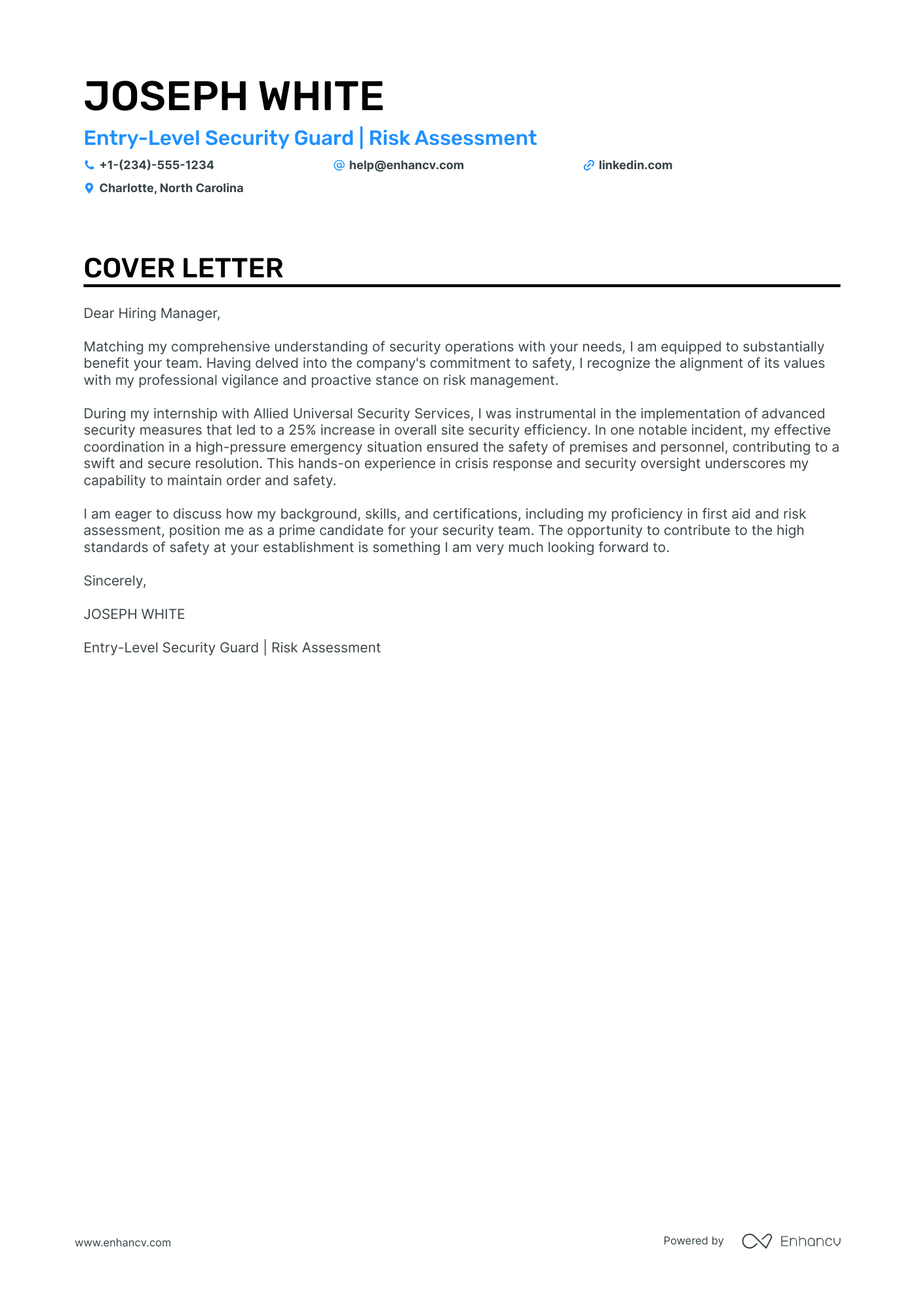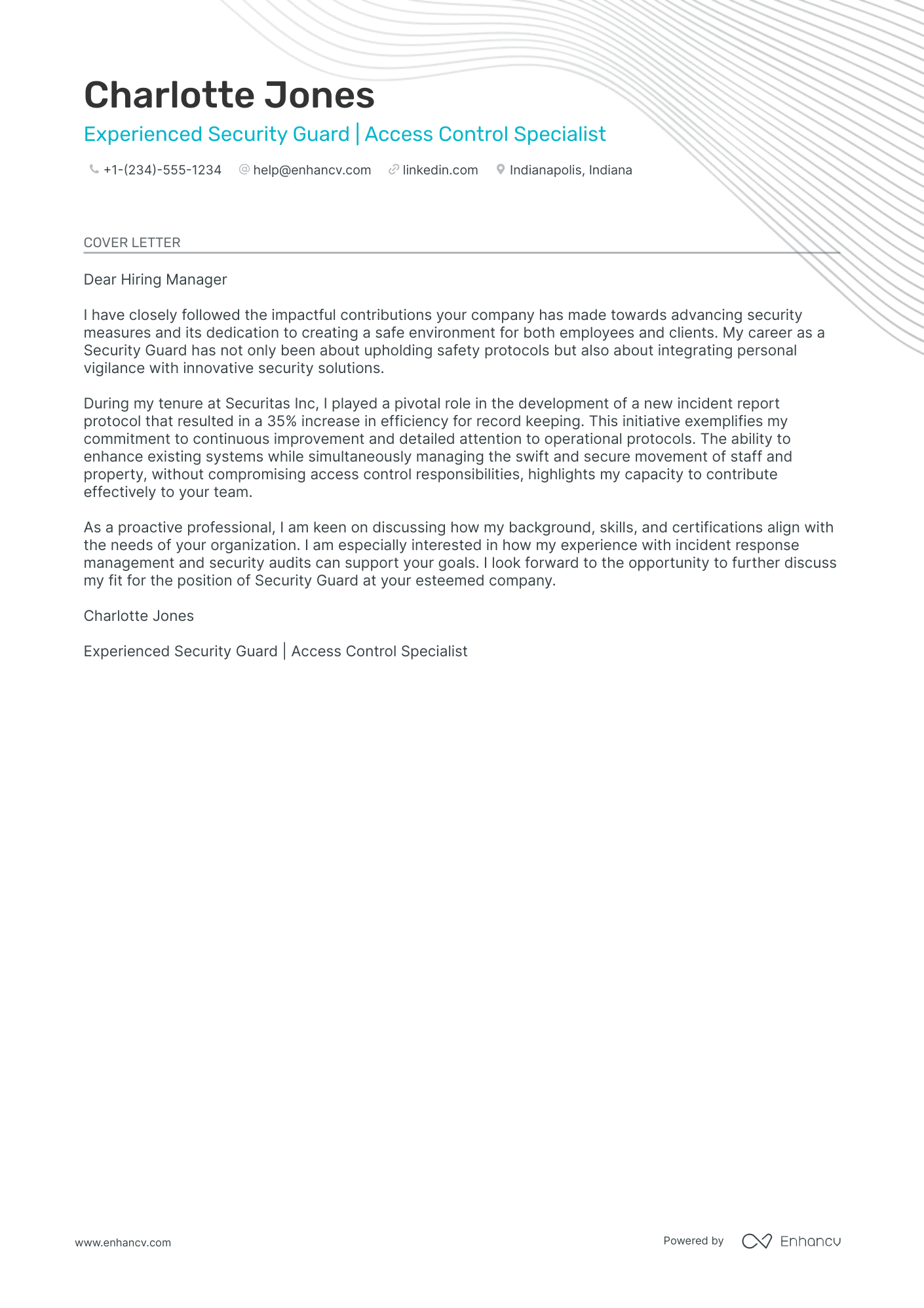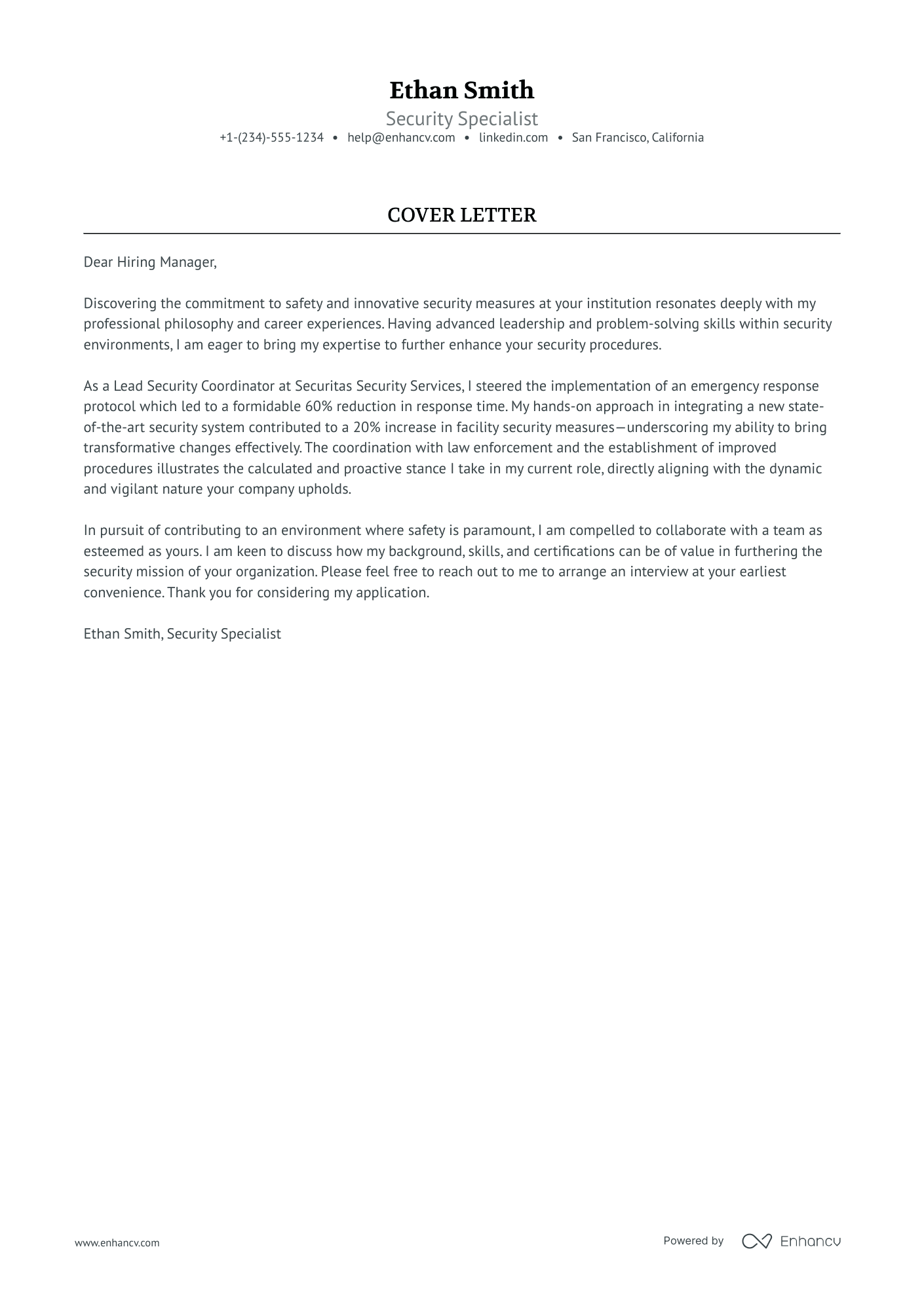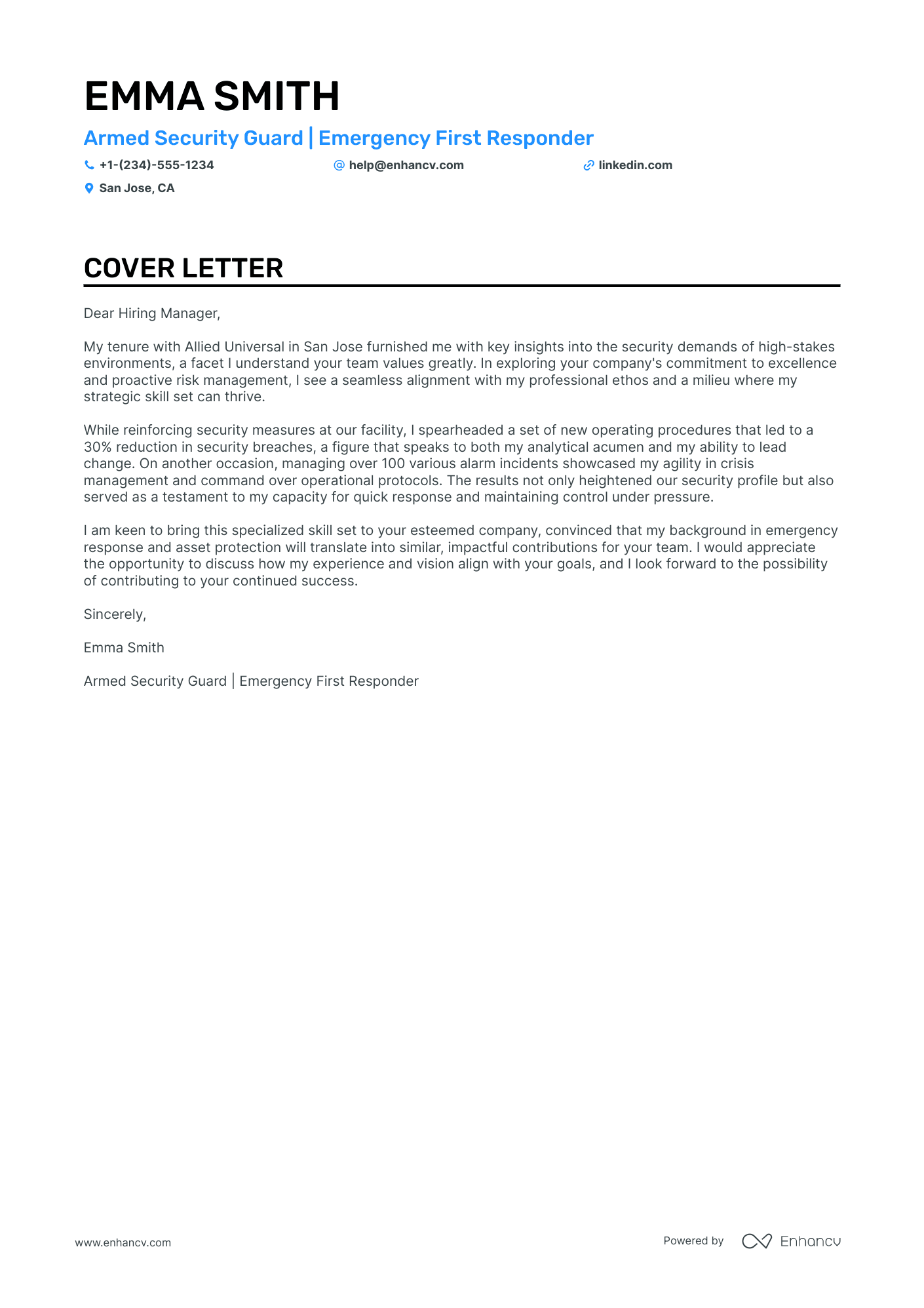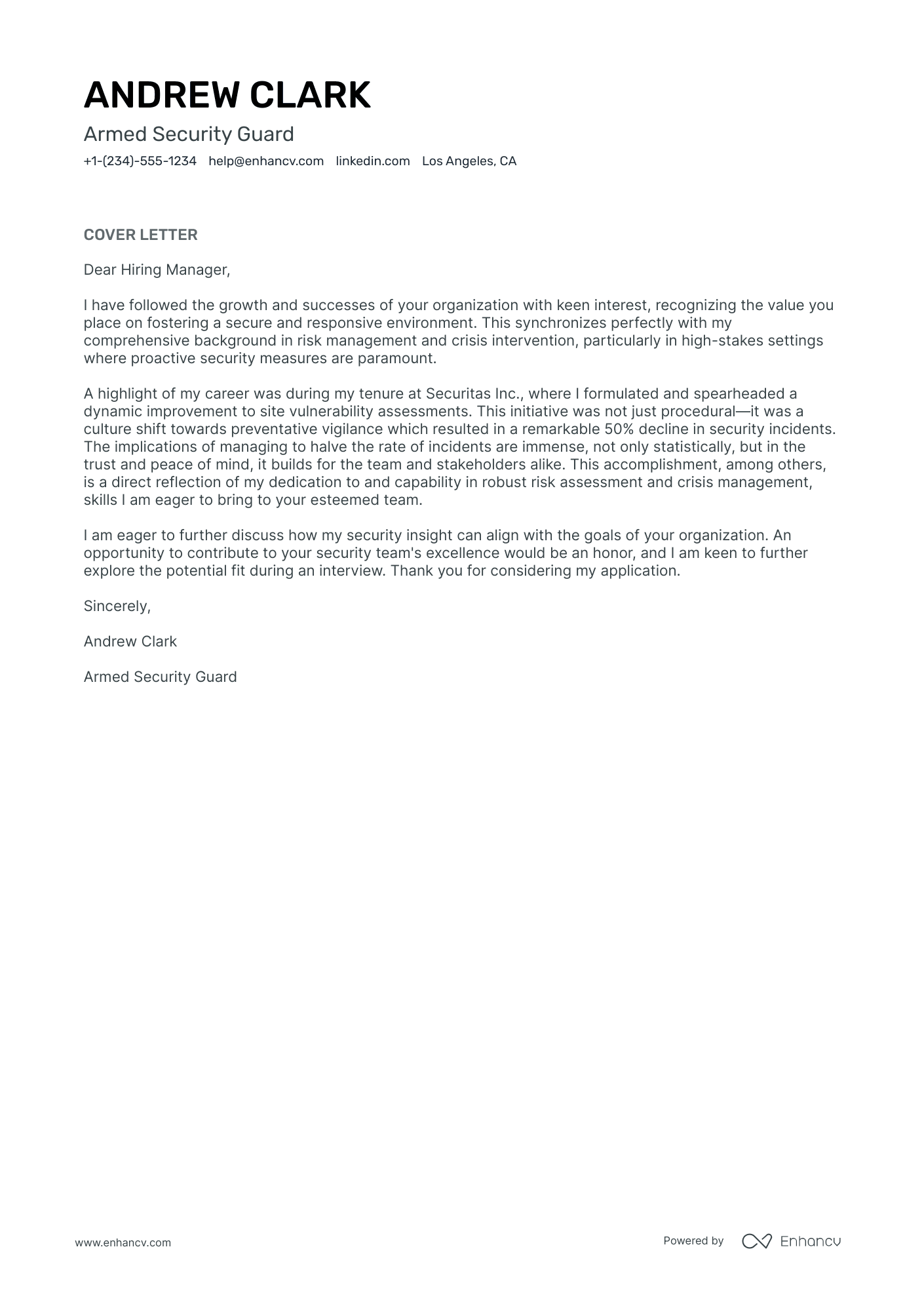Crafting a security guard cover letter can be a daunting task, especially when you realize it's a requirement after beginning your job applications. This crucial document should not be a repeat of your resume but rather a showcase of your most significant professional triumph. It must strike a balance between formality and originality, steering clear of overused phrases. And remember, brevity is key; your compelling narrative should fit neatly on a single page. Let's dive into how you can achieve just that.
- Making excellent use of job-winning real-life professional cover letters;
- Writing the first paragraphs of your security guard cover letter to get attention and connect with the recruiters - immediately;
- Single out your most noteworthy achievement (even if it's outside your career);
- Get a better understanding of what you must include in your security guard cover letter to land the job.
Let the power of Enhancv's AI work for you: create your security guard cover letter by uploading your resume.
If the security guard isn't exactly the one you're looking for we have a plethora of cover letter examples for jobs like this one:
- Security Guard resume guide and example
- Firefighter cover letter example
- Incident Manager cover letter example
- Security Manager cover letter example
- Unarmed Security Guard cover letter example
- Emergency Dispatcher cover letter example
- Volunteer Firefighter cover letter example
- Wildland Firefighter cover letter example
- Investigator cover letter example
- Retired Police Officer cover letter example
Drop your resume here or choose a file.
PDF & DOCX only. Max 2MB file size.
Security guard cover letter example
Elijah Brown
Columbus, Ohio
+1-(234)-555-1234
help@enhancv.com
- Emphasizing relevant experience: The cover letter highlights the candidate's leadership in upgrading company-wide surveillance systems, showing direct experience in a key area of security and risk management.
- Quantifying achievements: By stating specific percentages, the applicant provides concrete evidence of their contributions to reducing unauthorized access incidents and increasing safety policy adherence, demonstrating the tangible impact of their work.
- Demonstrating alignment with company values: The candidate makes a point of aligning their professional expertise and commitment with the company's innovative approach to integrated risk management, illustrating a strong cultural fit.
- Expressing enthusiasm for the company: The applicant conveys a genuine interest in the company by stating a desire to contribute to the team, which can help establish a positive connection with the hiring manager.
What about your security guard cover letter format: organizing and structuring your information
Here is one secret you should know about your security guard cover letter assessment. The Applicant Tracker System (or ATS) won't analyze your cover letter.
You should thus focus on making an excellent impression on recruiters by writing consistent:
- Header
- Greeting
- Introduction
- Body paragraphs (and explanation)
- Promise or Call to action
- Signature (that's optional)
Now, let's talk about the design of your security guard cover letter.
Ensure all of your paragraphs are single-spaced and have a one-inch margins on all sides (like in our cover letter templates).
Also, our cover letter builder automatically takes care of the format and comes along with some of the most popular (and modern) fonts like Volkhov, Chivo, and Bitter.
Speaking of fonts, professionals advise you to keep your security guard cover letter and resume in the same typography and avoid the over-used Arial or Times New Roman.
When wondering whether you should submit your security guard cover letter in Doc or PDF, select the second, as PDF keeps all of your information and design consistent.
Tight on time? Our free cover letter generator helps you create a cover letter instantly from your resume.
The top sections on a security guard cover letter
Header with Contact Information: Include your full name, address, phone number, and email address so the recruiter can easily reach you, as it demonstrates professionalism and attention to detail, which are key traits for a security guard.
Introduction: Clearly state the security guard position you are applying for, how you heard about it, and why you are interested in this specific role, as it shows you have a direct intention and understanding of the job requisites.
Body - Relevant Experience and Skills: Highlight your previous security work experience, specific skills such as surveillance systems knowledge or conflict de-escalation techniques, and any relevant certifications, to prove you have the practical abilities needed for the security guard position.
Body - Understanding of Security Protocols: Detail your experience with security protocols and procedures, and your commitment to safety and protection, as these are pivotal in showcasing your ability to maintain a secure environment.
Closing and Call to Action: Express your enthusiasm for the opportunity to discuss how you can contribute to the safety and security of the premises, and include a polite request for an interview, as it reinforces your eagerness and proactive approach to the role.
Key qualities recruiters search for in a candidate’s cover letter
Observation Skills: Being able to quickly notice out-of-place behaviors or items to prevent potential threats or incidents.
Physical Fitness: Necessary to handle long periods on foot patrol, respond to emergencies, and, if needed, restrain individuals causing disturbances.
Communication Skills: Effectively communicate with the public, report incidents to law enforcement, and de-escalate tense situations through verbal engagement.
Integrity and Honesty: Handling sensitive information and maintaining a trusting relationship with employers and clients.
Experience in Security Protocols: Understanding of surveillance systems, familiarity with alarm response, and knowledge of emergency procedures.
Licensing and Certifications: Holding relevant security guard licenses or certifications as required by law, which demonstrates a commitment to the field and knowledge of legal guidelines.
How to personalize your security guard cover letter greeting
Before you start writing your security guard cover letter, take the time to find out who is recruiting for the role.
Search for the recruiter's name on LinkedIn or the corporate website to address them personally in your security guard cover letter salutation.
What if you can't find out who's recruiting for the role?
Always aim to avoid the very impersonal "Dear Sir/Madam" - instead, opt out for "Dear HR Team" or "Dear Hiring Manager" to make a better first impression.
List of salutations you can use
- Dear Hiring Manager,
- Dear [Company Name] Team,
- Dear [Department Name] Director,
- Dear Mr./Ms. [Last Name],
- Dear [Job Title] Search Committee,
- Dear Human Resources Manager,
Your security guard cover letter intro: showing your interest in the role
On to the actual content of your security guard cover letter and the introductory paragraph.
The intro should be no more than two sentences long and presents you in the best light possible.
Use your security guard cover letter introduction to prove exactly what interests you in the role or organization. Is it the:
- Company culture;
- Growth opportunities;
- Projects and awards the team worked on/won in the past year;
- Specific technologies the department uses.
When writing your security guard cover letter intro, be precise and sound enthusiastic about the role.
Your introduction should hint to recruiters that you're excited about the opportunity and that you possess an array of soft skills, e.g. motivation, determination, work ethic, etc.
What to write in the middle or body of your security guard cover letter
Here's where it gets tricky.
Your security guard cover letter body should present you in the best light possible and, at the same time, differ from your resume.
Don't be stuck in making up new things or copy-pasting from your resume. Instead, select just one achievement from your experience.
Use it to succinctly tell a story of the job-crucial skills and knowledge this taught you.
Your security guard cover letter is the magic card you need to further show how any organization or team would benefit from working with you.
Closing remarks to end your security guard cover letter
Of course, you'll have to show gratitude to the recruiters, who have assessed your profile at the end of your security guard cover letter .
A "Thank you for the consideration" would work wonders, instead of the standard "Sincerely yours".
Do you want to make an even better impression?
Close off your security guard cover letter by promising how you see yourself excelling in the role and the positive impact you'd bring about.
A sentence that encourages some further action on the recruiter's end could also be a good way to close off the communication (e.g. provide your availability for an interview).
Is it beneficial to mention that you have no experience in your security guard cover letter?
Lacking professional experience isn't the end of the world for your security guard cover letter.
Just be honest that you may not have had roles in the industry, but bring about so much more.
Like, your transferable skills, attained thanks to your whole work and life experience (e.g. the skills your summer spent working abroad taught you).
Or, focus on what makes you, you, and that one past success that can help you stand out and impress recruiters (think of awards you've attained and how they've helped you become a better professional).
Alternatively, write about your passion and drive to land the job and the unique skill set you would bring to enhance the workplace culture.
Key takeaways
We hope this security guard cover letter writing guide has shown you how to:
- Format your security guard cover letter with the mandatory sections (e.g. header, greeting, intro, body, and closing) and select the right font (P.S. It should be the same as the one you've used for your resume);
- Substitute your lack of professional experience with your most noteworthy achievement, outside of work, or your dreams and passions;
- Ensure recruiters have a more personalized experience by tailoring your cover letter not just to the role, but to them (e.g. writing their first/last name in the salutation, etc.);
- Introducing your biggest achievement and the skills it has taught you in your security guard cover letter body;
- Write no more than two sentences in your security guard cover letter introduction to set the right tone from the get-go.
Security Guard cover letter examples
By Experience
Entry-Level Security Guard
By Role
